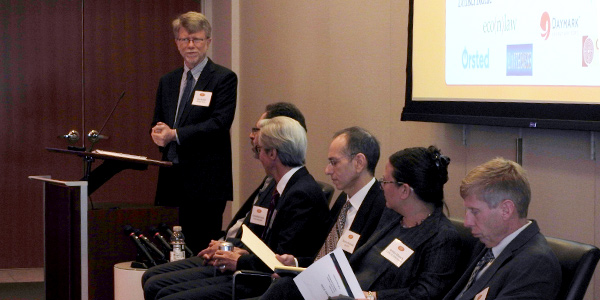By Christen Smith
PHILADELPHIA — Stakeholders agree PJM’s future likely involves carbon pricing, but they lack consensus on how the RTO will manage as many as 13 different state policies within the wholesale market over the next decade.
Stu Bresler, PJM’s senior vice president of operations and markets, said Wednesday that the RTO views its role in implementing external pricing as advisory and supplemental to state-enacted rules. Given the breadth of PJM’s territory, however, it’s not clear what such a system would look like or how varied it might be.
“I don’t think PJM has the authority to implement a carbon price,” Bresler said. “If state policymakers decide to price carbon in their jurisdiction, we could make it relatively simple as long as it’s systemwide and still achievable — but more complicated — if it’s only some states.”
Bresler’s comments came during Raab Associates’ Energy Policy Roundtable in the PJM Footprint, where panelists discussed what the PJM market might look like in 2030. They talked about their respective priorities on ensuring grid reliability, fuel security and resilience, and anticipating future technologies and integrating more renewable resources. Carbon pricing, however, dominated the conversation.
“We’ve reached an equilibrium where the natural gas units are no longer going to push coal retirements, and carbon emissions will increase,” said Ralph Izzo, CEO of Public Service Enterprise Group. “PJM must put in an external price marker … or it will become an irrelevant wholesale power market.”
In New Jersey, home to PSEG headquarters, the Board of Public Utilities on April 18 approved $300 million worth of zero-emission credits for its three nuclear reactors that struggle to profit at low wholesale prices set by polluting fossil fuels. Nuclear power provides more than a third of New Jersey’s emissions-free energy and remains vital to achieving the state’s ambitious clean energy goals, regulators said. (See NJ Approves $300M ZECs for Salem, Hope Creek Nukes.)
Pennsylvania lawmakers likewise continue talks on a pair of bills that would create the largest nuclear subsidy program in the country, while legislatures in Illinois, New York and Connecticut have approved their own nuclear subsidies. Executives at Exelon and FirstEnergy say the programs prevent premature retirements of reactors that provide clean, reliable energy 24/7, 365 days a year, despite a market design that doesn’t appropriately reimburse them for such service. (See Nuke Talks Continue in Pa. Assembly.)
“Many states probably have many questions beyond just, ‘What will the cost on carbon be?’ or ‘What happens to all the revenues?’” said Morris Schreim, senior adviser of the Maryland Public Service Commission on issues relating to PJM and FERC. “These could include, ‘Will our environmental policies be overtaken by for-profit utilities and other entities?’ Or, ‘Who will have jurisdiction over the air we breathe?’ Keep in mind, [Regional Greenhouse Gas Initiative] states never gave up their rights to a regional entity. Success in 2030 will be ensured if the answers to these questions stay within the realm of state policymakers.”
Kristin Munsch, deputy director of the Illinois Citizens Utility Board and president of the Consumer Advocates of PJM States, encouraged the RTO to take a more direct role rather than leaving it all to a “one-size-fits-all market design.”
“What I’d like to see PJM do is move from accommodating state policy to enabling it,” she said. “PJM in 2030 absolutely needs to think about how you enable this market.”
Izzo said an effective carbon price would drive onshore wind development and transmission expansion, while reducing the need for nuclear subsidies and crushing demand for rooftop solar — the most expensive of all renewable resource technologies, he said. More fossil fuel plants would likely retire, Bresler added.
PJM’s Markets and Reliability Committee endorsed a problem statement and issue charge on Thursday about implementing carbon pricing in the RTO. The effort will likely take more than two years, and it will consider ways to balance the concerns of states uninterested in enacting the policy. (See PJM Members Welcome Carbon Pricing Talks.)
“Dialogue is always important,” Schreim said of the effort. “An open stakeholder process could identify ways to provide value in meeting consumers’ needs that have never been considered before.”




